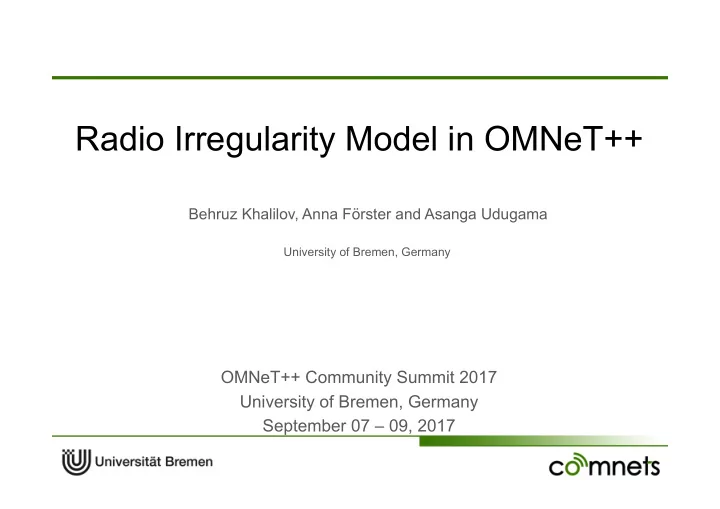

Radio Irregularity Model in OMNeT++ Behruz Khalilov, Anna Förster and Asanga Udugama University of Bremen, Germany OMNeT++ Community Summit 2017 University of Bremen, Germany September 07 – 09, 2017
Contents Motivation Radio Irregularity Model RIM Architecture in INET INET Implementation of RIM Evaluations Summary and Future Work 2
Motivation Wide range use of Wireless Sensor Networks in various domains Over 200 billion devices by 2020 Radio Irregularity is a non-negligible phenomenon Direct impact on a protocol performance Asymmetric link Loss of packets Large scale of Devices in the WSN - Large Require simulators – OMNeT++ Most of existing simulation models assume a spherical radio pattern Free Space Path Loss 3
RIM Model G. Zhou et al, Models and Solutions for Radio Irregularity in Wireless Sensor Networksd, ACM Transactions on Sensor Networks, May 2006 4
Radio Irregularity Model Introduces real data into simulations Hybrid approach Enhances isotropic radio models by targeting three main parameters Anisotropy Continuous variation Heterogeneity DOI – the degree of irregularity is introduced to denote the irregularity of a radio range 5
RIM Architecture in INET Fig. 1. Class inheritance diagram of the RIM implementa>on 6
• • • • – • – – • • – RIM Implementation • • • • Extends the FreeSpacePathLoss (FSPL) – • 𝑆𝑓𝑑𝑓𝑗𝑤𝑓𝑒𝑇𝑗𝑜𝑏𝑚𝑇𝑢𝑠𝑓𝑜𝑢ℎ = 𝑇𝑓𝑜𝑒𝑗𝑜 𝑄𝑝𝑥𝑓𝑠 − 𝐸𝑃𝐽𝐵𝑒𝑘𝑣𝑡𝑢𝑓𝑒𝑄𝑏𝑢ℎ𝑀𝑝𝑡𝑡 + 𝐺𝑏𝑒𝑗𝑜 Main algorithm: – – 𝐸𝑃𝐽𝐵𝑒𝑘𝑣𝑡𝑢𝑓𝑒𝑄𝑏𝑢ℎ𝑀𝑝𝑡𝑡 = 𝑄𝑏𝑢ℎ𝑀𝑝𝑡𝑡 ∗ 𝐿 𝑗 • Compute the path loss using FSPL • – Compute angle between sender and receiver Use the RIM Model to compute the DOI-adjusted path • loss 𝑆𝑓𝑑𝑓𝑗𝑤𝑓𝑒𝑇𝑗𝑜𝑏𝑚𝑇𝑢𝑠𝑓𝑜𝑢ℎ = 𝑇𝑓𝑜𝑒𝑗𝑜 𝑄𝑝𝑥𝑓𝑠 − 𝐸𝑃𝐽𝐵𝑒𝑘𝑣𝑡𝑢𝑓𝑒𝑄𝑏𝑢ℎ𝑀𝑝𝑡𝑡 + 𝐺𝑏𝑒𝑗𝑜 𝑺𝒃𝒐𝒆 – • • 𝐿 𝑗 𝐸𝑃𝐽𝐵𝑒𝑘𝑣𝑡𝑢𝑓𝑒𝑄𝑏𝑢ℎ𝑀𝑝𝑡𝑡 = 𝑄𝑏𝑢ℎ𝑀𝑝𝑡𝑡 ∗ 𝐿 𝑗 the start of the simulation run for each node. RIM Implementation in OMNeT++ 1; 𝑗 = 0. • 𝐿 𝑗 = 𝐿 𝑗 ± 𝑆𝑏𝑜𝑒 ∗ 𝐸𝑃𝐽; 0 < 𝑗 < 360° • • – |𝐿 0 − 𝐿 359 | ≤ 𝐸𝑃𝐽 • – • 𝑺𝒃𝒐𝒆 – • • 𝐿 𝑗 Compute path loss using FSPL Coefficients of irregularity (k i ) are pre-computed! • 1; 𝑗 = 0. • 𝐿 𝑗 = 𝐿 𝑗 ± 𝑆𝑏𝑜𝑒 ∗ 𝐸𝑃𝐽; 0 < 𝑗 < 360° 𝐿 𝑗 • • – |𝐿 0 − 𝐿 359 | ≤ 𝐸𝑃𝐽 • – 7 • 𝐸𝑃𝐽 𝐵𝑒𝑘𝑣𝑡𝑢𝑓𝑒 𝑄𝑏𝑢ℎ 𝑀𝑝𝑡𝑡 = 𝑄𝑏𝑢ℎ𝑀𝑝𝑡𝑡 ∗ 𝐿 𝑗 • • 𝐿 𝑗 𝐸𝑃𝐽 𝐵𝑒𝑘𝑣𝑡𝑢𝑓𝑒 𝑄𝑏𝑢ℎ 𝑀𝑝𝑡𝑡 = 𝑄𝑏𝑢ℎ𝑀𝑝𝑡𝑡 ∗ 𝐿 𝑗 • •
Parameters Random numbers are generated using the Weibull distribution a – The scale parameter of the Weibull distribution. b – The shape parameter of the Weibull distribution DOI – The degree of irregularity 8
Evaluations Represents the variation of path losses in a different directions 9
Summary RIM – illustrates the irregularity of a radio range. Based on real dataset Estimates path losses in an anisotropic environment Purpose of this work – implementation of the RIM model in OMNeT++ Currently available at Github (search: RIMFading ) 10
Future Works RIM is limited in a space domain. The effect of time is neglected. The model does not consider any obstacles in between 11
Thank You. 12
Recommend
More recommend